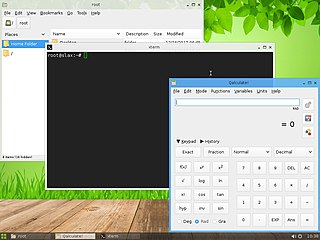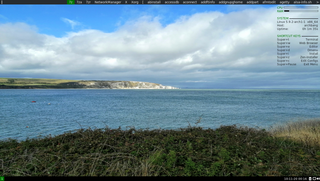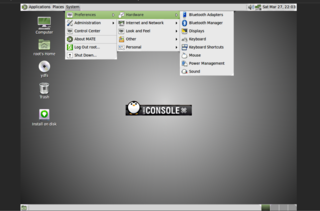
A Linux distribution is an operating system made from a software collection that includes the Linux kernel and often a package management system. Linux users usually obtain their operating system by downloading one of the Linux distributions, which are available for a wide variety of systems ranging from embedded devices and personal computers to powerful supercomputers.

Knoppix, stylized KNOPPIX, is an operating system based on Debian designed to be run directly from a CD / DVD or a USB flash drive. It was first released in 2000 by German Linux consultant Klaus Knopper, and was one of the first popular live distributions. Knoppix is loaded from the removable medium and decompressed into a RAM drive. The decompression is transparent and on-the-fly.

A live CD is a complete bootable computer installation including operating system which runs directly from a CD-ROM or similar storage device into a computer's memory, rather than loading from a hard disk drive. A live CD allows users to run an operating system for any purpose without installing it or making any changes to the computer's configuration. Live CDs can run on a computer without secondary storage, such as a hard disk drive, or with a corrupted hard disk drive or file system, allowing data recovery.

Damn Small Linux (DSL) is a computer operating system for the x86 family of personal computers. It is free and open-source software under the terms of the GNU GPL and other free and open-source licenses. It was designed to run graphical user interface applications on older PC hardware, for example, machines with 486 and early Pentium microprocessors and very little random-access memory (RAM). DSL is a live CD with a size of 50 megabytes (MB). What originally began as an experiment to see how much software could fit in 50 MB eventually became a full Linux distribution. It can be installed on storage media with small capacities, like bootable business cards, USB flash drives, various memory cards, and Zip drives.

Slax is a LiveCD Linux distribution developed by Tomáš Matějíček and based on upstream customizable Linux distributions. Packages can be added by apt package manager or can be prepared as modules. The tagline for Slax refers to itself as "your pocket operating system".

PCLinuxOS, often shortened to PCLOS, is a rolling release Linux distribution for x86-64 computers, with KDE Plasma, MATE, and XFCE as its default user interfaces. It is a primarily FOSS operating system for personal computers aimed at ease of use.
Puppy Linux is a family of light-weight Linux distributions that focus on ease of use and minimal memory footprint. The entire system can be run from random-access memory (RAM) with current versions generally taking up about 600 MB (64-bit), 300 MB (32-bit), allowing the boot medium to be removed after the operating system has started. Applications such as AbiWord, Gnumeric and MPlayer are included, along with a choice of lightweight web browsers and a utility for downloading other packages. The distribution was originally developed by Barry Kauler and other members of the community, until Kauler retired in 2013. The tool Woof can build a Puppy Linux distribution from the binary packages of other Linux distributions.

VectorLinux, abbreviated VL, is a Linux distribution for the x86 platform based on the Slackware Linux distribution, originally developed by Canadian developers Robert S. Lange and Darell Stavem. Since version 7 the Standard Edition is also available for the x86-64 platform, known as VLocity64 7.

Finnix is a Debian-based Live CD operating system, developed by Ryan Finnie and intended for system administrators for tasks such as filesystem recovery, network monitoring and OS installation. Finnix is a relatively small distribution, with an ISO download size of approximately 100 MiB, and is available for the x86 and PowerPC architectures, and paravirtualized systems. Finnix can be run off a bootable CD, a USB flash drive, a hard drive, or network boot (PXE).

A live USB is a portable USB-attached external data storage device containing a full operating system that can be booted from. The term is reminiscent of USB flash drives but may encompass an external hard disk drive or solid-state drive, though they may be referred to as "live HDD" and "live SSD" respectively. They are the evolutionary next step after live CDs, but with the added benefit of writable storage, allowing customizations to the booted operating system. Live USBs can be used in embedded systems for system administration, data recovery, or test driving, and can persistently save settings and install software packages on the USB device.

SliTaz GNU/Linux is a lightweight Linux distribution, community-based, suitable for use on older hardware and as a Live CD or Live USB. SliTaz stands for "Simple, Light, Incredible, Temporary Autonomous Zone" according to the boot screen.

Tiny Core Linux (TCL) is a minimal Linux kernel based operating system focusing on providing a base system using BusyBox and FLTK. It was developed by Robert Shingledecker, who was previously the lead developer of Damn Small Linux. The distribution is notable for its small size and minimalism; additional functions are provided by extensions. Tiny Core Linux is free and open-source software licensed under the GNU General Public License version 2.

Calculate Linux is a Linux distribution optimized for fast deployment in an organization environment. It is based on the Gentoo Linux project and includes many preconfigured functions.

Porteus is a portable operating system based on Slackware. It does not require installation and can be run from fixed and removable media, such as a USB flash drive or compact disc.

ArchBang Linux is a simple lightweight rolling release Linux distribution based on a minimal Arch Linux operating system with the i3 tiling window manager, previously using the Openbox stacking window manager. ArchBang is especially suitable for high performance on old or low-end hardware with limited resources. ArchBang's aim is to provide a simple out-of-the-box Arch-based Linux distribution with a pre-configured i3 desktop suite, adhering to Arch principles.

ROSA Linux is a Linux operating system distribution, developed by the Russian company 'LLC NTC IT ROSA'. It is available in three different editions: ROSA Desktop Fresh, ROSA Enterprise Desktop, and ROSA Enterprise Linux Server, with the latter two aiming at commercial users. Its desktop computer editions come bundled with closed-source software such as Adobe Flash Player, multimedia codecs, and Steam.

LinuxConsole is a Linux distribution independently developed by Yann Le Doaré. LinuxConsole should be written as a single word, and the use of the word "console" in the name does not relate to Linux's system console mode but instead represents its aim of providing a system more simple to use similar to that of a gaming console. This distro is built from scratch by developers from France, and has support for multiple languages. It is not based on any other Linux distribution and primarily features being lightweight and easily accessible. LinuxConsole can function as a live CD or live USB. It can also be installed as a complete operating system.

















